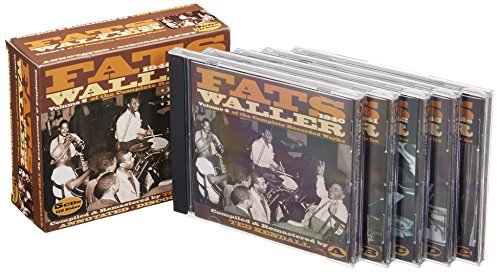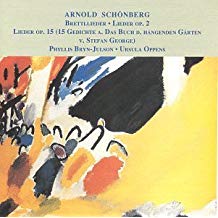-
Posts
13,205 -
Joined
-
Last visited
-
Donations
0.00 USD
Content Type
Profiles
Forums
Events
Blogs
Everything posted by Larry Kart
-
Legrand's music in the French films that he wrote some of it for -- now we're talking. I'm particularly fond of "Donkey Skin." D
-
Sorry -- incomplete post. The perhaps or somewhat unrelated things are 1) the quality of the Bergmans' lyrics 2) their behavior toward Lew Spence 3) the nature and quality of Legrand's music -- which I like and would like, if possibe, to detach from the Bergmans' lyrics, just I would liike to detach Jobim's music from Gene Lees' lyrics.
-
TTK: Just to be clear, we're talking about two different and probablyt unrelated things: The q
-
I have "The Sons of Sauter-Finegan" and just listened to it. Not very S-F like, it's a series of showcases (with some minimalistic Finegan charts) for several of the band soloists: trumpeters Bobby Nichols and Nick Travis, trombonists Sonny Russo and Tommy Mitchell, and Joe Venuto. The two-trombone tracks are rather J&K-like -- both men are fluent soloists though not strikingly individual. Nichols, who came to some prominence at an early age with the Miller AAF band, was a lovely lyrical player -- kind of a cross between Bobby Hackett and Don Fagerquist; don't know what became of him after his S-F days. His feature on flugelhorn, "Over the Rainbow," is something else. The three duo tracks with Nichols and Travis are quite adventurous and successfully so -- almost "free" playing, they bring to mind some passages from the Stravinsky Octet. BTW, Finegan is on piano and is a tasty comper.
-
Opinions about the merits of the Bergmans as lyricists vary. Speaking only for myself, any team that can come up with, for example, the nagging sonic baggage of: What are you doing the rest of your life North and South and East and West of your life I have only one request of your life That you spend it all with me All the seasons and the times of your days Are the nickels and the dimes of your days Let the reasons and the rhymes of your days All begin and end with me I want to see your face in every kind of light In fields of gold and forests of the night And when you stand Before the candles on a cake Oh, let me be the one to hear The silent wish you make Those tomorrows waiting deep in your eyes In a world of love you keep in your eyes I'll awaken what's asleep in your eyes It may take a kiss or two Through all of my life Summer, winter, spring and fall of my life All I ever will recall of my life Is all my life with you Through all of my life Summer, winter, spring and fall of my life All I ever will recall of my life Is all my life with you deserve to rest forever on a ledge in Purgatory. By the time we get to "request," I want to scream. As for "All the seasons and the times of your days/ Are the nickels and the dimes of your days" -- there my head wants to explode. But, then, others clearly feel otherwise. about the Bergmans' gifts. As for the dishonesty, for some damn reason I can't cut and paste the several posts from the singers/songwriters blog Songbirds that deal with this, but it has to do with the Bergmans' relationship to the late composer/lyricist Lew Spence ("That Face"/"Nice and Easy," et al). Spence, an older man, was an early mentor of and sometime partner with Alan. Spence wrote "That Face" after he saw and fell in love with actress Phyllis Kirk in a studio commissary. (He later dated Kirk.) Spence had a problem completing the lyric, and Alan helped him do so. Later on, Alan claimed that he had written it all himself and that it was inspired by the face of Marilyn Keith, his future wife. Something similar happened with "Nice and Easy." In both cases, Spence got his fair share of the royalties, but the Bergmans have always said that "That Face" was Alan's work and inspired by Marilyn's punim and that "Nice and Easy" was theirs. Those in the songwriting community who knew differently regard the Bergmans with disdain over this. OK -- here's this from author Bill Reed's blog: In yesterday's L.A. Times, an article about the admittedly not-untalented lyric writing duo of Marilyn and Alan Bergman contains the following quote "A cash-starved Alan wrote 'That Face' as an engagement gift for Marilyn," While just last month, in an obit for Lew [Spence] in the Times, there is another version of the event in question: "One night while dining at Frascasti's Restaurant in Beverly Hills with Bob Carroll (I Love Lucy'), Phyllis Kirk walked in and immediately, Lew fell in love. He went over to her and said, in true Lew style, 'You are beautiful!' She patted the seat next to her and invited him to sit down. The very next morning he got up and wrote the entire melody and the main lyric to 'That Face' as a tribute to her beauty." Yet. . .when the song was published, and subsequently recorded by Fred Astaire, Alan Bergman took full credit for the lyric. But Lew kept his own counsel, apparently (sweetheart that he was) not wanting to destroy the illusion of Alan's "engagement gift." Perhaps he should have quit while still ahead. For just a few short years later, the same thing happened with the song "Nice 'n Easy." Only this time BOTH Bergmans took sole credit for the lyric, while---again---Lew was accorded only a "music" credit. Finally, that ripped it. Not long afterward, Lew severed all ties with the couple. Of course, there are always three sides to every story---yours, mine and the truth. Don't ask me why, but I tend to believe Spence's "side" in regard to both of these occurences. The schism between Lew Spence and the Bergmans is well-known in the songwriting community. It's too bad that the L.A. Times sent a writer to profile the Bergmans who was so unfamiliar with the subject matter being written about that she could only traffic in the received wisdom of Marilyn and Alan Bergman. Lew's "side" of the story should have at least been alluded to.
-
Too bad IMO that he hooked at times with the rather talentless and, in some cases, dishonest lyric-writing team of Mariiyn and Alan Bergman.
-

Cats are Troublemakers...
Larry Kart replied to Teasing the Korean's topic in Miscellaneous - Non-Political
He's a gem, and quite a fresser, demanding to be fed on schedule or else. I dubbed him Baby because I'd never known a cat who craved human contact so much. Got him from a shelter back in 2008; when I'd lie in bed reading he'd typically sit purring on my chest between me and the book. Now he has to share the manse with Scout (below), -- a corgi/bull terrier/dalmatian combo (so her DNA test said) who arrived about four years ago. They get along. -
Hope you like it; If you like Waller you almost certainly will. It covers 1940-43, and most (maybe all) of the good deal of Waller I had came from before 1940. For some reason the apparent (I think it's actual) increased fidelity of these transfers especially alters my sense of Fat's vocals; they seem a good deal more shaded and subtle than I recall.
-

Cats are Troublemakers...
Larry Kart replied to Teasing the Korean's topic in Miscellaneous - Non-Political
-
I believe Davies was Kendall's mentor.
-
Thanks for the correction, Allen. In any case, what I've heard of this set so far is a revelation to me.
-
Bought this today, and so far I'm stunned: https://www.amazon.com/Complete-Recorded-Works-Waller-2009-03-24/dp/B01K8O88R4/ref=sr_1_1?s=music&ie=UTF8&qid=1548549836&sr=1-1&keywords=fats+waller+volume+6 The last of Waller, on 5 CDs. Much of this material is unfamiliar to me, and what I'm hearing ls superb. This comment from Amazon is on the money: 'JSP is to be commended for its investment of monetary and technical resources into issuing this series. All of Fats' recorded work was issued by RCA Bluebird, but as is their habit, they relied heavily on Sonic Solutions "No-Noise" to "clean up" the sonic detritus of years of neglect from Victor of the original metal masters. The net effect was to my ears an artificial sonic representation of the original sound. The top end tends to be cramped and tinny. What [Ted] Kendall has done is to set proper pitch and use minimal filtering to achieve a more truthful record of what Fats laid down in the studio.' I've never heard Fat's voice and piano-playing with such presence and clarity. What a joy! And by no means is there any slacking off in Fats' Rhythm. Gene Sedric in particular is in fine form, and based on what I've heard so far, I prefer trumpeter John Hamilton to the Waller veteran he replaced, Herman Autrey.
-

What Classical Music Are You Listening To?
Larry Kart replied to StarThrower's topic in Classical Discussion
Takacs Quartet, Beethoven Op. 127. Listening to the first movement, which begins in a stentorian manner and than alternates between that manner and relatively softer episodes, I find it very difficult in the Takacs recording to make out much of what's going on, even at times the actual pitches, in some of the softer passages, especially after the 4:00 minute mark. It's certainly not my playback system or my hearing, because those same passages are quite clear on at least two other Op. 127 recordings, the Guarneri (RCA) and the Yale (Vanguard). Has anyone else encountered this problem with the Takacs set? My assumption is that the Takacs (and/or Decca's recording engineer) just got too coy for their/his own good here. If so, that would be a shame, because otherwise the performance sounds like it might be quite a good one. I recall that the original Takacs Beethoven set was issued later on in remastered form. Did the remastered version solve the problem I've mentioned? -

Sauter-Finegan "Memories of Goodman and Miller"
Larry Kart replied to Larry Kart's topic in Recommendations
Phil Woods on "Volga Boatman"? Otherwise, sorry if my comments were misleading. -

Sauter-Finegan "Memories of Goodman and Miller"
Larry Kart replied to Larry Kart's topic in Recommendations
Love the look/vibe of Joe Venuto; not unlike Joe Pesci in "Goodfellas." -

Sauter-Finegan "Memories of Goodman and Miller"
Larry Kart replied to Larry Kart's topic in Recommendations
I wasn't quite there at the time -- that is, while I was an adolescent jazz fan in 1954-5, I wasn't in the S-F crowd; the big bands I dug were Basie and Ellington-- but I think it's fair to say, on the basis of how the S-F band was marketed and seemingly received, that two of its major selling points to its fans were 1)"Hi Fi" sound (this both on record and in concert, where as you probably the music was reproduced to some degree through an elaborate portable mixer, operated by Finegan and devised by Sauter's brother, "an electronic's wizard" who worked for Bell Labs), and 2) its perceived and embraced by its audience "cleverness" (i.e. however "cleverness' is defined," significant aspects of S-F music were regarded by their fans of the time as notably novel/sophisticated/unconventional etc. and were pleasing to them in part for those reasons. From a latter-day vantage point, I do enjoy some of that S-F cleverness, not to mention the band's remarkable execution of those pieces, and I would think that some S-F fans of the time and later on sorted things out on a similar basis. BTW, as I said above, to the degree that I thought that much about S-F at the time, my musical "antipodes" to S-F were not "blowing sessions throughout" but Basie and Ellington, both the Basie and Ellington music of that time and their music of the '30s and early '40s. From whence it dribbles down the drain? -

Sauter-Finegan "Memories of Goodman and Miller"
Larry Kart replied to Larry Kart's topic in Recommendations
However much SF there was, I think that much of it has been reissued, singly or in sets, by Euro labels of the familiar sort. Thus the economic viability of a Mosaic set probably would be "meh." -

Sauter-Finegan "Memories of Goodman and Miller"
Larry Kart replied to Larry Kart's topic in Recommendations
Your tingly spider sense probably should be trusted, but this record, especially the Finegan half, is less over the top clever than other S-F music I know. As Bill Kirchner said, "From a jazz point of view, it’s probably the best of the S-F albums." But then your typical S-F fan probably doesn't have that much of a jazz point of view. OTOH, if you see the album used for a few bucks or less... I'll add that the Duvivier-Lamond bass and drums team keeps things swinging by and large, and that both the orchestral execution and the sound quality (on my mono pressing) are exceptional. -

Sauter-Finegan "Memories of Goodman and Miller"
Larry Kart replied to Larry Kart's topic in Recommendations
I also thought it would be a rehash, which is why I didn't listen to it after I bought it for 50 cents or so. But a rehash it's not IMO. BTW, I found the Finegan-Miller tracks here more interesting than the Sauter-Goodman ones, perhaps because the former in their original form were more plain than the Goodman-Sauter originals and thus offered c. 1958 Finegan more room for variation-invention than the already rather worked-up vintage Sauter-Goodman pieces left room for c. '58 Sauter. -
Another LP from the distant past that I found on my shelves— bought it used a few years ago and may not have ever sat down and listened to it before — “Sauter-Finegan Memories of Goodman and Miller” (RCA, 1958). Based on the personnel lists in the booklet of the one Sauter-Finegan CD I have, “Directions in Music,” an RCA compiliation that includes one track from the Goodman-Miller album (I have several other S-F LPs), the band here is a mix of S-F vets and some NY studio regulars of the time: Doc Severinsen, Al DeRisi, Joe Ferrante, tpts.; Rex Peer, Sonny Russo, Tom Mitchell, trbs.; Jay McAllister, tuba; Walt Levinsky, Phil Woods, Al Block, Al Klink, Wally Kane, Gene Allen, reeds; Lou Stein, piano; Nanette Norton, harp; Mundell Lowe, guitar; George Duvivier, bass;, Don Lamond, drms; Joe Venuto, per. — a formidable batch of executants, and do they play their asses off. And the writing is quite something too — not reproductions of Finegan and Sauter's vintage Miller and Goodman charts but more or less a series of inventive fantasies from S and F on the likes of “Little Brown Jug," “Clarinet a la King,” “Song of the Volga Boatman,” “Benny Rides Again," etc. Levinsky takes the clarinet solos on the Goodman pieces, expert playing but more Shaw-like than Goodman-esque, and there are a number of solos from unidentified others, although Woods is unmistakable and in fine form on “Volga Boatman.” My friend Bill Kirchner says, "From a jazz point of view, it’s probably the best of the S-F albums."
-
IIRC my problem with it is Scotty Holt. I heard him in a club in Chicago with Jackie at about that time, and in the course of one of Holt's "Hey, look at me, Ma!" solos, Jackie said ""ridiculous shit." I'm aware that this could well have been a term of praise, but I took it as the simple truth.
-
I remember an excellent session c.1967 with Kalaparusha and fellow tenorman Fred Schwartz at the house that drummer Doug Mitchell I shared in Hyde Park; bass player might have been Clyde Flowers. Also recall, from about the same time, an Ajaramu/Claudine Myers gig at a club on Stony Island where Kalaparusha and Roscoe sat in, and when "Happy Birthday" was requested for the standard reason, they proceeded to play on it quite seriously for a good length of time.
-

What Classical Music Are You Listening To?
Larry Kart replied to StarThrower's topic in Classical Discussion
-

What Classical Music Are You Listening To?
Larry Kart replied to StarThrower's topic in Classical Discussion
Different in what way? Listened to the beginning of Concerto 5 -- awfully fast. My wife said, "Give them the yellow flag." -
Especially the NYC and LA studio guys of the '50s. It's a bit circular, but to some degree that can be chalked up to Myers' taste for those big band sounds, and it was those players who were making those sounds by and large. Backtracking a bit, that Johnny Richards album that Myers extolled, "Something Else," is fairly nutty/surreal even by Richards' standards -- albeit nutty/surreal in an entertaining manner IMO. Its saving grace is that, unlike some other Richards' efforts, it's not particularly pretentious.
_forumlogo.png.a607ef20a6e0c299ab2aa6443aa1f32e.png)



